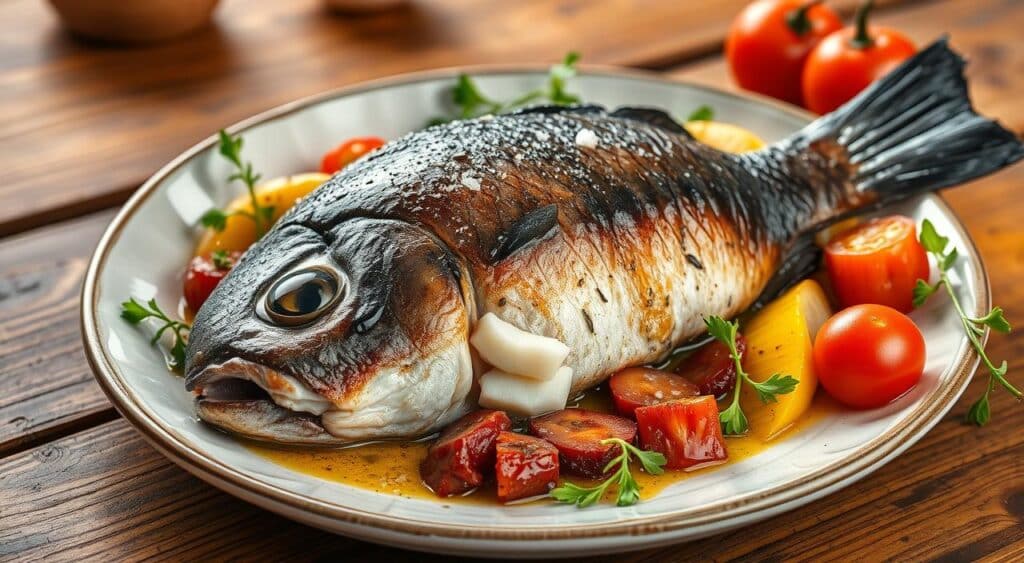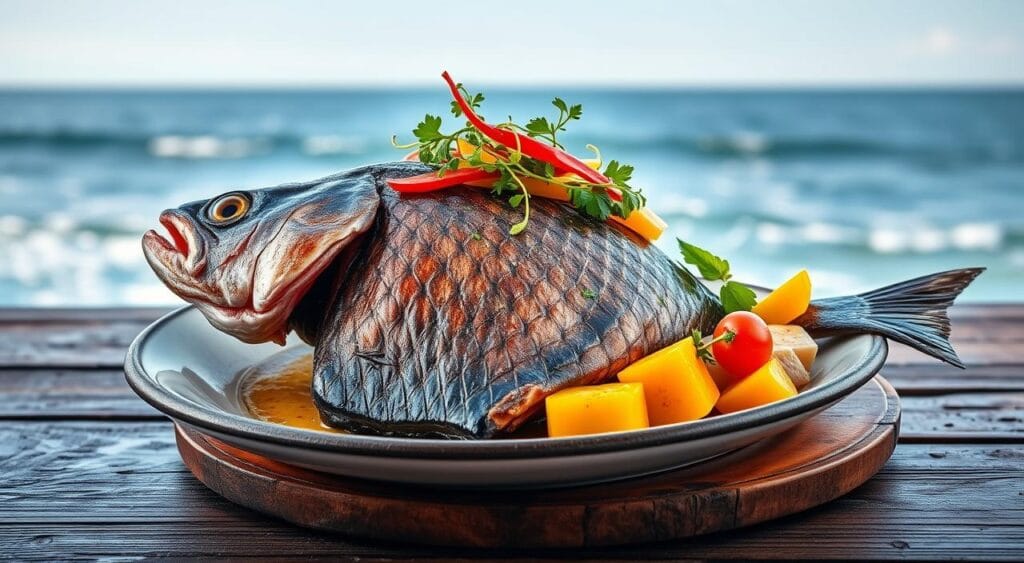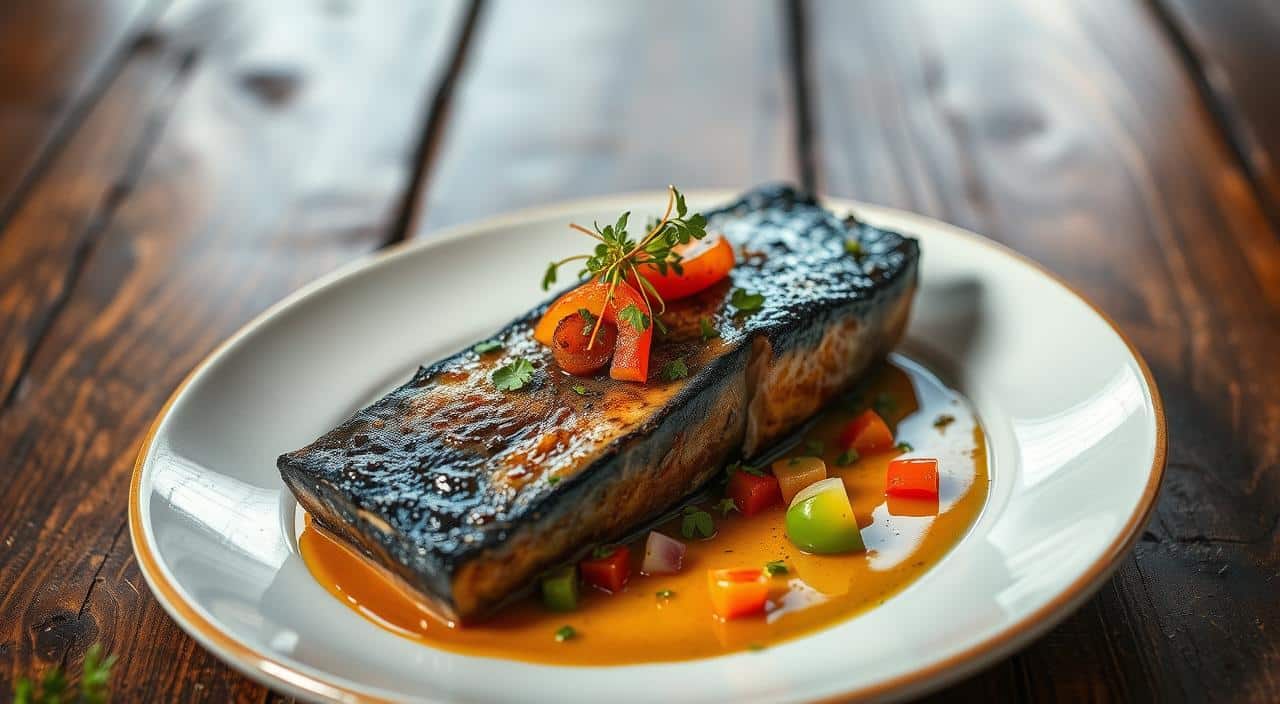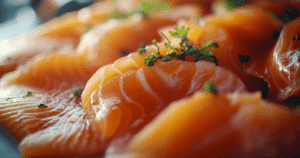Jump to:
Estimated reading time: 10 minutes
Table of contents
Is black cod fish healthy? Black cod, also known as sablefish or butterfish, is a fish rich in nutrients. It’s found in the Pacific and Atlantic oceans. Its tender, flaky white flesh and nutritional profile make it stand out. Black cod is full of vitamins like B12, iron, selenium, and magnesium. It’s also rich in omega-3 fatty acids EPA and DHA, and high-quality protein.
Eating black cod regularly can boost heart health, lower inflammation, and help muscles grow. Its versatility in cooking and lower mercury levels make it a healthy choice for your diet.
Is black cod fish healthy? Key Takeaways
- Black cod is an excellent source of omega-3 fatty acids, vitamins, and minerals.
- Eating black cod can improve heart health, reduce inflammation, and support muscle growth.
- Black cod has lower mercury levels than some other types of fish.
- Black cod is versatile in cooking and can be a great addition to a balanced diet.
- Individuals with fish allergies should consult a doctor before adding black cod to their diet.
Introduction
Black cod, also known as sablefish, lives in the Pacific Ocean’s cold waters. It’s found mainly along Alaska, Canada, and the U.S. coasts. This fish has been a prized delicacy for centuries, loved worldwide for its rich taste and health benefits.
We’ll dive into black cod’s origins, characteristics, and why it’s becoming more popular. Knowing more about this fish helps you enjoy its health perks and unique taste.

The Origins and Characteristics of Black Cod
Black cod, or Anoplopoma fimbria, has been eaten by humans for thousands of years. It thrives in the North Pacific’s cold, nutrient-rich waters. European explorers first documented it during their voyages.
This fish can grow up to five feet long. It has a black or dark gray top and a silvery belly. Its buttery flavor and flaky texture make it a favorite among seafood lovers.
Global Popularity and Culinary Traditions
Black cod’s fame has spread through trade, reaching many countries. It’s a delicacy in Japan, China, the U.S., Canada, the U.K., and Australia. It’s enjoyed in various dishes to showcase its unique taste.
In Japan, it’s used in sushi and sashimi. In Western cuisines, it’s baked, grilled, or pan-seared. Its appeal to health-conscious eaters has boosted its popularity.
| Nutrient | Amount per 3-oz Serving of Cooked Black Cod |
|---|---|
| Calories | 131 |
| Protein | 15 grams |
| Fat | 6 grams |
| Omega-3 Fatty Acids | Up to 22% |
Why People Ask: Is Black Cod Healthy?
Black cod, also known as sablefish, is now popular among those who care about their health. It has a great nutritional profile, unlike many other fish. It has more omega-3s, vitamins, minerals, and lean protein than salmon.
Is black cod fish healthy? Popularity of Black Cod in Diets
Sablefish (black cod) is available fresh or frozen from March to November. It’s pricier than cod but tastes better and has a rich texture. Health-focused people like it because it’s packed with nutrients.
Is black cod fish healthy? Comparison to Other Fish in Terms of Nutrition
Black cod has over a thousand milligrams of omega-3s per 4-ounce serving. This is great for heart and brain health. It’s also good for the environment and has low mercury levels.
Is black cod fish healthy? Health Conscious Consumers and Black Cod
Black cod is a lean protein source with about 20 grams per 3-ounce serving. It’s also full of selenium and magnesium. These nutrients support immune function, muscle health, and bone strength. This makes black cod a favorite among those looking to eat better.
| Nutritional Comparison Between Black Cod and Other Fish | Black Cod | Salmon | Tuna |
|---|---|---|---|
| Omega-3s (mg per 4 oz serving) | 1,000+ | 1,800 | 500 |
| Protein (g per 3 oz serving) | 20 | 22 | 26 |
| Mercury Levels | Low | Moderate | High |
| Sustainability Rating | High | Moderate | Low |

Nutritional Benefits of Black Cod
Black cod, also known as sablefish, is a remarkable seafood option. It has an impressive nutritional profile. This fish offers many health benefits, making it a great choice for your diet.
Is black cod fish healthy? High Omega-3 Fatty Acids for Heart Health
Black cod is known for its high omega-3 fatty acids, especially EPA and DHA. These healthy fats help lower cholesterol and heart disease risk. Eating black cod supports heart health and reduces heart-related issues.
Is black cod fish healthy? Essential Vitamins: D, B12, and Selenium
Black cod is also rich in essential vitamins and minerals. It’s a great source of vitamin D for bone health and immune function. It also has vitamin B12 for brain function and red blood cells. Plus, it contains selenium, an antioxidant that fights oxidative stress.
Is black cod fish healthy? Protein Content: A Lean Source of Protein
Black cod is also an excellent protein source. A 3-ounce serving has about 20 grams of protein. This makes it a lean and satisfying meal option. The protein in black cod is great for athletes and those who want to build muscle.
| Nutrient | Amount per 3-ounce serving |
|---|---|
| Protein | 20 grams |
| Omega-3 Fatty Acids (EPA and DHA) | 1.5 grams |
| Vitamin D | 536 IU |
| Vitamin B12 | 9.8 micrograms |
| Selenium | 39.2 micrograms |
Incorporating black cod into your diet boosts essential nutrients. It supports overall health and well-being.
Black Cod vs. Other Fish: What Makes It Healthier?
While salmon is known for its omega-3s, black cod shines in other areas. It has lower mercury levels than some fish, making it safer to eat often. The black cod fishery is also sustainable, using methods like long-lining to protect the environment.
Lower Mercury Levels Compared to Other Fish
Black cod, or sablefish, has less mercury than tuna and halibut. This is good news for pregnant women, kids, and those worried about mercury. Its deep-sea habitat and sustainable fishing practices help keep mercury levels low.
Sustainability and Environmental Impact
The Alaskan black cod fishery is a leader in sustainability. It uses long-lining and trapping to catch this fish, reducing bycatch and habitat damage. This approach helps keep black cod populations healthy and abundant, making it a green choice for seafood.
How Black Cod Fits into a Balanced Diet
Black cod is rich in omega-3s, making it great for a healthy diet. It pairs well with whole grains, veggies, and lean proteins. Its versatility lets you enjoy it in many dishes, from tacos to stir-fries, adding flavor and nutrition to your meals.
| Nutrient Comparison | Black Cod | Salmon |
|---|---|---|
| Omega-3 Fatty Acids | Higher | Lower |
| Mercury Levels | Lower | Higher |
| Sustainability | Highly Sustainable | Sustainable, but some concerns |
| Calories | Higher | Lower |
Black cod stands out for its low mercury, sustainability, and nutritional value. It’s a smart choice for a healthy, balanced diet. Its unique benefits and eco-friendly fishing practices make it a great addition to your meals.
How to Prepare Black Cod for a Healthy Meal
Black cod is known for its delicate, buttery taste. It’s great for many healthy cooking methods. You can grill, bake, or steam it without adding unhealthy fats or additives.
Best Cooking Methods: Grilling, Baking, and Steaming
Grilling black cod over medium-high heat adds a smoky flavor. It keeps the fish moist and flaky. Baking at 400°F for 12-15 minutes lets the natural flavors shine.
Steaming black cod fillets for 8-10 minutes makes them tender and succulent. This method is gentle and preserves the fish’s texture.
Avoiding Unhealthy Additives: Butter vs. Olive Oil
Use healthy fats like olive oil when cooking black cod. Olive oil is better than butter because it’s full of heart-healthy fats. It keeps your meal light and nutritious.
Pairing Black Cod with Nutrient-Dense Sides
Pair black cod with sides like roasted veggies, quinoa, or wild rice. These sides add vitamins, minerals, and fiber. For example, baked black cod with roasted Brussels sprouts and sweet potatoes is a tasty, healthy choice.
“Black cod’s buttery texture and mild flavor make it a versatile addition to any healthy meal. With the right cooking techniques and nutrient-rich sides, you can enjoy this delicious fish while reaping its many health benefits.”
Health Concerns or Myths About Black Cod
While black cod is a healthy seafood choice, there are some concerns. It has a bit more mercury than some fish. So, it’s best to eat black cod 2-3 times a week. Also, some people might be allergic to it, so watch for any bad reactions.
Is Black Cod Safe to Eat Frequently?
Black cod is a good choice, but eating too much fish isn’t good. The FDA says to limit black cod to 2-3 servings a week to stay safe from mercury. If you have health issues or special diets, talk to your doctor before eating black cod.
Debunking Myths Around Fat Content and Calories
Black cod isn’t very fatty. It’s actually a lean protein that’s good for you. With only 4 grams of fat and 150 calories in 3.5 ounces, it helps with weight and health.
Allergies and Black Cod: What to Know
- Some people might be allergic to black cod.
- Allergy symptoms include hives, rash, swelling, trouble breathing, or stomach problems.
- If you have a bad reaction, stop eating it and see a doctor.
Knowing about health concerns and myths lets you enjoy black cod safely. Eating it in moderation and being aware of your needs is important. This way, you can get the most out of this tasty and healthy seafood.
Frequently Asked Questions: Is black cod fish healthy?
How does black cod’s fat content benefit health?
The high fat content in black cod provides ample omega-3 fatty acids, which support heart health by lowering cholesterol levels, reducing blood pressure, and helping reduce the risk of heart disease. Omega-3s are also beneficial for joint health and skin.
Is black cod good for weight management?
Yes, black cod is a great choice for weight management. It’s a lean source of protein that helps you feel fuller longer, and the healthy fats contribute to satiety without adding excessive calories. Its nutrient density makes it a satisfying, healthy addition to a balanced diet.
Does black cod contain any important vitamins or minerals?
Black cod is rich in vitamins B12 and D, which support energy metabolism and bone health, respectively. It also provides selenium, an antioxidant mineral that supports the immune system and protects cells from damage.
Is black cod safe to eat frequently?
Yes, black cod is generally safe to eat frequently because it’s low in mercury compared to other fish. Its high levels of healthy fats, vitamins, and minerals make it a nutritious choice that can be enjoyed regularly as part of a balanced diet.
Conclusion: Why Black Cod is a Nutritious Choice for Your Diet
Black cod, also known as sablefish, is a seafood that’s packed with nutrients. It’s rich in omega-3 fatty acids, vitamins, minerals, and lean protein. This makes it a great choice for anyone looking to improve their health.
The omega-3s in black cod are especially good for your heart. They help lower cholesterol and reduce the risk of heart disease. These fatty acids also fight inflammation, which can help prevent chronic diseases like arthritis and asthma.
Black cod is more than just good for your heart. It’s also a great source of vitamin B12 and selenium. Vitamin B12 boosts brain function, while selenium can help reduce wrinkles and protect against age-related eye diseases. Plus, its high protein content supports muscle growth and repair, making it perfect for people of all ages.






